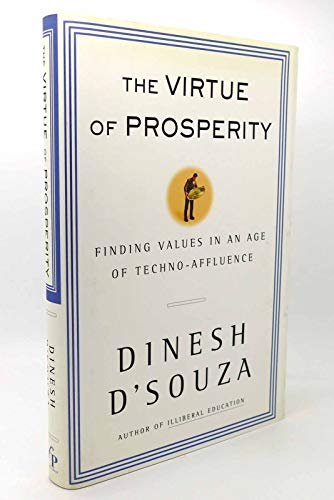We live in an era of unprecedented prosperity. The United States has created the first mass affluent class in world history, and most of us are more successful than we ever dreamed we could be. New technologies have given us extraordinary abilities to communicate and share information, and also godlike power over nature and ourselves. Yet, individually and collectively, we are divided about the new economy. Its champions embrace the power of technological capitalism and the wealth it creates -- they believe it will feed and heal and liberate the world. Its detractors warn that techno-capitalism creates enormous inequalities, undermines families and communities, and destroys our most cherished values. How can we heal this division that runs deep in our society, and in our hearts? How can we learn to be happy with our success? In The Virtue of Prosperity, former White House policy analyst Dinesh D'Souza offers the first in-depth analysis of the spiritual and social crisis that has been spawned by the new economy and new technologies. Drawing upon original reporting, including more than a hundred interviews with leading entrepreneurs, scholars, social and religious activists, and tech tycoons, D'Souza brings to life the heated debate over how we are all affected by the massive changes under way. D'Souza creates an unforgettable portrait of some of the movers and visionaries in today's economy: Steve Jobs, Eric Schmidt, George Gilder, T. J. Rodgers, and Ted Turner. But he also digs deep to understand what people who are not in the new economy vanguard -- scholars, pundits, clergy, ordinary workers -- think and feel about our new prosperity. He reveals the surprising ways in which old political allegiances have blurred and elements of the left and the right are uniting in resistance to the new world celebrated by the techno-utopians. D'Souza poses the tough questions: By what right does a Web entrepreneur who can't show a profit accumulate wealth equal to the gross national product of a small country, while the average person struggles to make ends meet? What do we risk if, using the power of technology, we extend our life span, select the traits we want in our children, and control the evolution of our species into the "post-human"? From the unique perspective of an immigrant, D'Souza explores the premise of the American dream -- that prosperity will better the human condition. He welcomes the liberation from necessity and drudgery that technology and affluence bring, but he argues that they cannot solve the basic human question: What is the significance of my life? D'Souza will surprise readers across the political spectrum with his original vision of how we can actually do well while doing good, and succeed while making society better.He shows how to preserve nature, strengthen our families and communities, and expand our intellectual horizons in a techno-capitalist world. Ultimately, D'Souza reveals how we can harness the power of technology and affluence to promote individual fulfillment and the common good.
The chief problem societies have faced "since the time of the Babylonians," writes Dinesh D'Souza, has been the problem of scarcity. "But now that age has passed, and America has a new problem: coping with prosperity." It's a good problem to have, but also a serious, even debilitating, one. "The moral conundrum of success," the author continues, means that all too often, "the body is flourishing, but somehow the soul still feels malnourished." D'Souza is well known for his bestselling conservative books
Illiberal Education,
The End of Racism, and
Ronald Reagan. On these pages, however, he seems to set politics aside to ask deep questions about the meaning of life in a world of material abundance:
What is my life for? As affluence spreads ... hundreds of millions of people will be asking just this question. That they can ask it is in and of itself a great moral achievement, because it opens up to innumerable ordinary people the avenues of human fulfillment that were previously open only to aristocrats. Yet at the same time it is a strangely disquieting question, because there is no complete answer to it within the modern techno-capitalist framework.
The Founders promised "the pursuit of happiness," but they didn't explain where happiness can be found, or even what it is. D'Souza argues that it must not be found in materialism--in both the consumerist sense of the word as well as the philosophical one. In a time of unprecedented prosperity, of course, the temptation is to find happiness exactly there, and the threat is profound: materialism may "transform our very nature as human beings and possibly introduce a new species in the world, the posthuman." D'Souza does not welcome this prospect (and consequently sounds very conservative indeed).
The Virtue of Prosperity is a bold and thoroughly engrossing book. Readers won't need to agree with every one of D'Souza's points to find his many digressions fascinating. Whether he's writing about an extravagant Silicon Valley party, describing the ideas of Richard Dawkins, or making a casual reference to Marcus Aurelius, he's at once erudite and accessible. It's not always clear where he's going with his ideas until he gets there, but he makes the journey a pure joy.
--John J. Miller![]()
